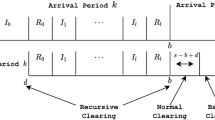Abstract
We consider a system with a single queue and multiple server pools of heterogeneous exponential servers. The system operates under a policy that always routes a job to the pool with longest cumulative idleness among pools with available servers, in an attempt to achieve fairness toward servers. It is easy to find examples of a system with a fixed number of servers, for which fairness is not achieved by this policy in any reasonable sense. Our main result shows that in the many-server regime of Halfin and Whitt, the policy does attain equalization of cumulative idleness, and that the equalization time, defined within any given precision level, remains bounded in the limit. An important feature of this policy is that it acts ‘blindly’, in that it requires no information on the service or arrival rates.
Similar content being viewed by others
References
Armony, M., Ward, A.R.: Fair dynamic routing in large-scale heterogeneous-server systems. Preprint (2008)
Armony, M., Ward, A.R.: Blind fair routing in large-scale service systems. Preprint
Atar, R.: Central limit theorem for a many-server queue with random service rates. Ann. Appl. Probab. 18(4), 1548–1568 (2008)
Atar, R., Shwartz, A.: Efficient routing in heavy traffic under partial sampling of service times. Math. Oper. Res. 33, 899–909 (2008)
Avi-Itzhak, B., Levy, H., Raz, D.: Quantifying fairness in queueing systems: principles and applications. Preprint (2004)
Billingsley, P.: Convergence of Probability Measures. Wiley, New York
Dai, J.G., Tezcan, T.: State space collapse in many server diffusion limits of parallel server systems. Preprint
Gurvich, I., Whitt, W.: Queue-and-idleness-ratio controls in many-server service systems. Math. Oper. Res. 34, 363–396 (2009)
Halfin, S., Whitt, W.: Heavy-traffic limits for queues with many exponential servers. Oper. Res. 29(3), 567–588 (1981)
Hale, J.K.: Ordinary Differential Equations. Krieger, Huntington (1980)
Jacod, J., Shiryaev, A.: Limit Theorems for Stochastic Processes. Springer, Berlin (1987)
Stolyar, A.L., Tezcan, T.: Control of systems with flexible multi-server pools: a shadow routing approach. Preprint (2008)
Tseytlin, Y.: Queueing systems with heterogeneous servers: improving patients’ flow in hospitals. Research Proposal, The Faculty of Industrial Engineering and Management, Technion (2007)
Wierman, A.: Fairness and classification. Perform. Eval. Rev. 34(4), 4–12 (2007)
Author information
Authors and Affiliations
Corresponding author
Additional information
Research supported in part by BSF (Grant 2008466), ISF (Grant 1349/08) and the fund for promotion of research at the Technion.
Research supported in part by BSF (Grant 2008466), ISF (Grant 1349/08) and the Viterbi Postdoctoral Fellowship.
The Julius M. and Bernice Neiman Chair in Engineering. Research supported in part by BSF (Grant 2008466) and the fund for promotion of research at the Technion.
Rights and permissions
About this article
Cite this article
Atar, R., Shaki, Y.Y. & Shwartz, A. A blind policy for equalizing cumulative idleness. Queueing Syst 67, 275–293 (2011). https://doi.org/10.1007/s11134-011-9212-7
Received:
Revised:
Published:
Issue Date:
DOI: https://doi.org/10.1007/s11134-011-9212-7




